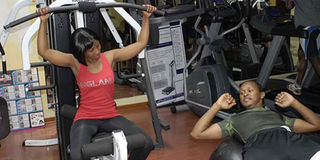Working out and education keep your brain ‘young’

A study shows that education and physical activity affect the difference between a physiological prediction of age and chronological age, and that people can actively do something to help their brains stay young. PHOTO | FILE
What you need to know:
- Researchers found that brain age decreases by 0.95 years for each year of education, and by 0.58 years for every daily flight of stairs climbed, that is, stairs between two consecutive floors.
- The researchers used magnetic resonance imaging examine brains of 331 healthy adults who ranged in age from 19 to 79
Education and physical activity can significantly slow down brain ageing, Concordia University in Canada said in a press release, citing a study by the institution.
In the paper released on Wednesday, “Differences between chronological and brain age are related to education and self-reported physical activity”, researchers led by Jason Steffener show that the more flights of stairs a person climbs, and the more years of school a person completes, the “younger” their brain physically appears.
They found that brain age decreases by 0.95 years for each year of education, and by 0.58 years for every daily flight of stairs climbed, that is, stairs between two consecutive floors.
The researchers used magnetic resonance imaging examine brains of 331 healthy adults who ranged in age from 19 to 79.
They measured the volume of grey matter found in participants’ brains because its decline, caused by neural shrinkage and neuronal loss, is a very visible part of the chronological aging process. Then they compared brain volume to the participants’ reported number of flights of stairs climbed, and years of schooling completed.
Results were clear: the more flights of stairs climbed, and the more years of schooling completed, the younger the brain.
“This study shows that education and physical activity affect the difference between a physiological prediction of age and chronological age, and that people can actively do something to help their brains stay young,” Mr Steffener said.
“In comparison to many other forms of physical activity, taking the stairs is something most older adults can and already do at least once a day, unlike vigorous forms of physical activity,” he said. “This is encouraging because it demonstrates that a simple thing like climbing stairs has great potential as an intervention tool to promote brain health.”
The paper is in the journal Neurobiology of Aging.





